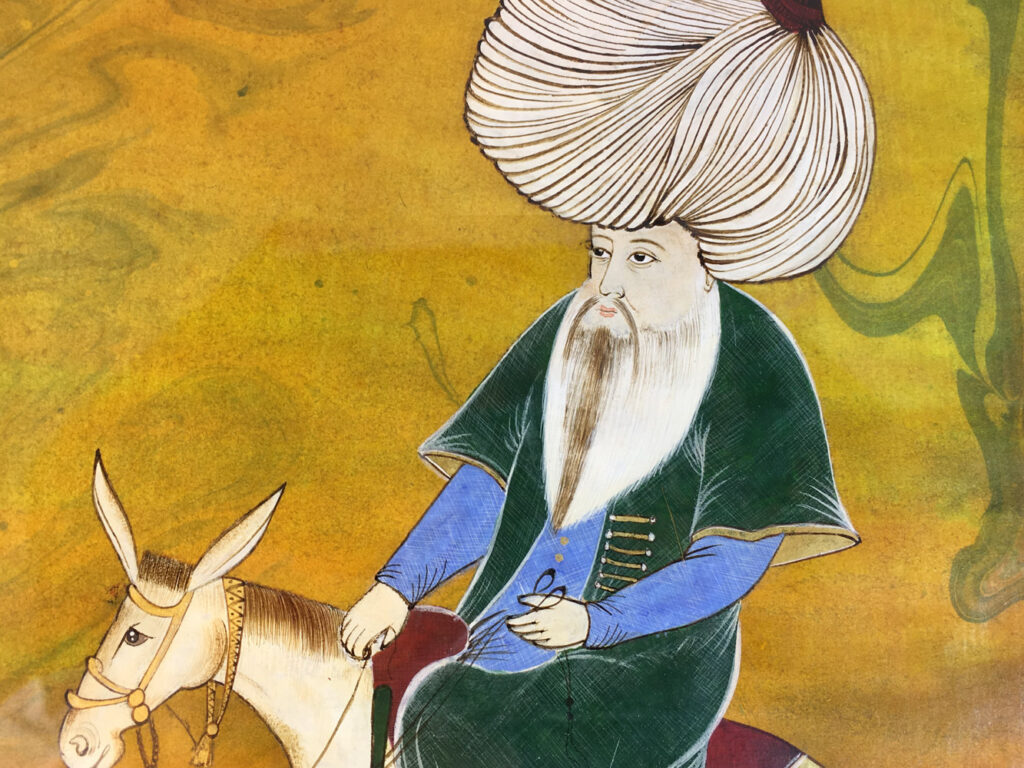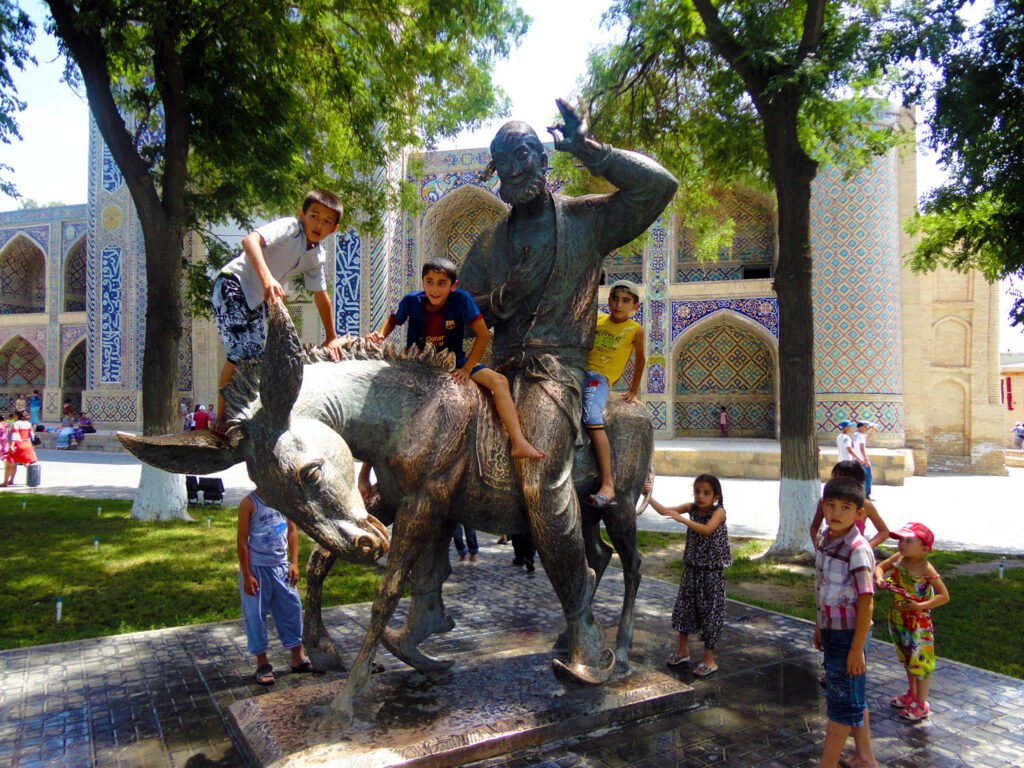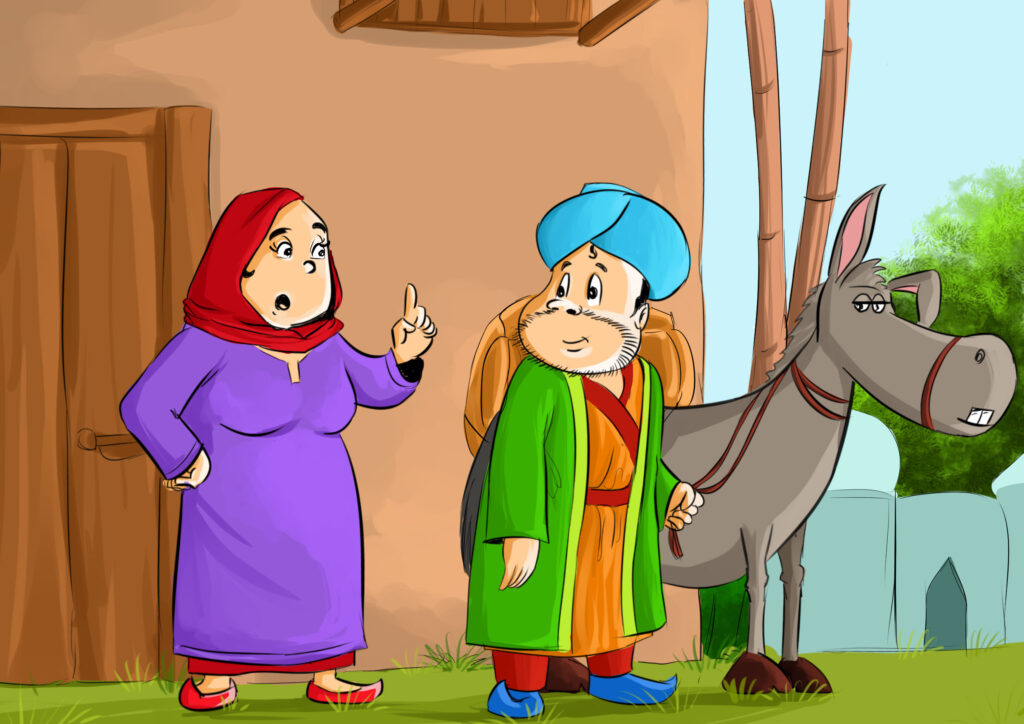Nasreddin Hodja : Tales from Turkey
Introduction
Nasreddin Hodja is Turkey’s (and perhaps all of Islam’s) best-known trickster. His legendary wit and droll trickery were possibly based on the exploits and words of a historical imam. Nasreddin reputedly was born in 1208 in the village of Horto near Sivrihisar. In 1237 he moved to Aksehir, where he died in the Islamic year 683 (1284 or 1285). As many as 350 anecdotes have been attributed to the Hodja, as he most often is called. Hodja is a title meaning teacher or scholar. He frequently is compared with the northern European trickster Till Eulenspiegel.

Nasreddin Hodja was a philosopher, wise, witty man with a good sense of humor. His stories have been told almost everywhere in the world, spread among the tribes of Turkic World and into Persian, Arabian, African and along the Silk Road to China and India cultures, later also to Europe. Of course, all these stories currently attributed to the Hoca for about 800 years haven’t originated from him. Most of them are the product of collective Humor of not only Turks but also other folks in the World. Nasreddin Hodja, or Hoca which means “teacher” or “religious leader” in Turkish (“c” is pronounced in Turkish like “dj” or like “J” in “John” in English), is known as with different names in the world. Some examples; Turks say “Nasreddin Hoca”, Kazakhs “Koja Nasreddin”, Greeks “Hoja Nasreddin”, Azerbaijanis and Iranians “Molla or Mulla Nasreddin”, Arabs “Juha”, and Tajiks “Mushfiqi”. And some spellings of Nasreddin are: Nasrudin, Nasr ed-din and Nasr al-din. The year 1996 was proclaimed “Nasreddin Hoca year” by UNESCO. He signed the humor of the millennium at the top.

Turkey is one of the top five countries with up to 18 registered elements on the list, among the 178 countries party to the Convention for the Safeguarding of the Intangible Cultural Heritage. With the addition of two elements previously offered, the number of registered elements the country has included on the list is expected to rise to 20 upon the convention of the 15th meeting of UNESCO’s Intergovernmental Committee for Safeguarding of the Intangible Cultural Heritage. The two other cultural elements being offered with other countries include the art of miniature – in cooperation with Iran, Azerbaijan, and Uzbekistan and moderated by Turkey – as well as Mangala / Köçürme, a traditional game of intelligence and strategy, offered in partnership with Kazakhstan and Kyrgyzstan.
Tales from Who is Nasreddin Hodja

Everyone Is Right
Once, when Nasreddin Hodja was serving as qadi, one of his neighbors came to him with a complaint about a fellow neighbor. The Hodja listened to the charges carefully, then concluded, “Yes, dear neighbor, you are quite right.” Then, the other neighbor came to him. The Hodja listened to his defense carefully, then concluded, “Yes, dear neighbor, you are quite right.” Having listened in on the entire proceeding, the Hodja’s wife said to him, “Husband, both men cannot be right.” The Hodja answered, “Yes, dear wife, you are quite right.”
Walnuts and Pumpkins
Nasreddin Hodja was lying in the shade of an ancient walnut tree. His body was at rest, but befitting his calling as an imam, his mind did not relax. Looking up into the mighty tree, he considered the greatness and wisdom of Allah. “Allah is great, and Allah is good,” said the Hodja, “but was it wise that such a great tree be created to bear only tiny walnuts as fruit? Behold the stout stem and strong limbs. They could easily carry the pumpkins that grow from spindly vines in yonder fields, vines that cannot begin to bear the weight of their fruit. Should not walnuts grow on weakly vines and pumpkins on sturdy trees?” So thinking, the Hodja dosed off, only to be awakened by a walnut that fell from the tree, striking him on his forehead. “Allah be praised!” he exclaimed, seeing what had happened. “If the world had been created according to my meager wisdom, it would have been a pumpkin that fell from the tree and hit me on the head. It would have killed me for sure! Allah is great! Allah is good! Allah is wise!” Never again did Nasreddin Hodja question the wisdom of Allah.
Taste the same
Some children saw Nasreddin coming from the vineyard with two baskets full of grapes loaded on his donkey. They gathered around him and asked him to give them a taste. Nasreddin picked up a bunch of grapes and gave each child a grape. “You have so much, but you gave us so little,” the children whined. “There is no difference whether you have a basketful or a small piece. They all taste the same,” Nasreddin answered and continued.
Cauldron
Nasreddin Hodja had borrowed a cauldron from his neighbor. The neighbor knocked on the door when he didn’t return it for a long time. `Hodja Effendi, if you finish the cauldron, could I return it? The wife needs it today.’ `Ah, of course,’ Hodja said, `just wait here a minute, and I’ll fetch it.’ When Hodja returned to the door with the cauldron, the neighbor noticed a small pot in it. `What is this?’ `Well, neighbor, congratulations, your cauldron gave birth to a baby pot.’ said the Hodja. The neighbor, incredulous yet delighted, thanked the Hodja, took his cauldron and the new little pot, and went home. A few weeks after this incident, The Hodja came again one day, asking to borrow the cauldron. The neighbor didn’t even hesitate and lent Hodja the cauldron with pleasure. However, once more, it took the Hodja forever to return it. The neighbor had no choice but to go asking for it again. `Hodja Effendi, are you done with the cauldron?’ `Ahh neighbor, ahh,’ bemoaned The Hodja, `I am afraid your cauldron is dead.’ `Hodja Effendi, that’s impossible; a cauldron cannot die!’ exclaimed the disbelieving neighbor. But Nasreddin Hodja had his answer ready. `My dear fellow, you can believe that it can give birth; why can’t you believe that it can also die?’
Faith Moves Mountains
The Hodja was boasting about the power of his faith. “If your faith is so strong, pray for that mountain to come to you,” said a skeptic, pointing to a distant mountain. The Hodja prayed fervently, but the mountain did not move. He prayed more, but the hill remained unmoved. Finally, the Hodja got up from his knees and began walking toward the mountain. “I am a humble man,” he said, “and the faith of Islam is a practical one. If the mountain will not come to the Hodja, then the Hodja will go to the mountain.”
The Smell of Soup and the Sound of Money
A beggar was given a piece of bread but nothing to put on. Hoping to get something to go with his bread, he went to a nearby inn and asked for a handout. The innkeeper turned him away with nothing, but the beggar sneaked into the kitchen, where he saw a large pot of soup over the fire. He held his piece of bread over the steaming pot, hoping thus to capture a bit of flavor from the good-smelling vapor. Suddenly, the innkeeper seized him by the arm and accused him of stealing soup. “I took no soup,” said the beggar. “I was only smelling the vapor.” “Then you must pay for the smell,” answered the innkeeper. The poor beggar had no money, so the angry innkeeper dragged him before the qadi. Now, Nasreddin Hodja was serving as qadi, and he heard the innkeeper’s complaint and the beggar’s explanation. “So you demand payment for the smell of your soup?” summarized the Hodja after the hearing. “Yes!” insisted the innkeeper. “Then I will pay you,” said the Hodja, “and I will pay for the smell of your soup with the sound of money.” Thus, the Hodja drew two coins from his pocket, rang them together loudly, put them back into his pocket, and sent the beggar and the innkeeper each on his way.
The Debt
Nasreddin was strolling through the marketplace when a shopkeeper accosted him, criticizing the Hodja loudly for failing to pay a debt. “My dear friend,” answered the Hodja, “just how much do I owe you?” “Seventy-five piasters,” shouted the angry shopkeeper. “Now, now,” replied the Hodja. “You must know that I intend to pay you thirty-five piasters tomorrow and next month another thirty-five. That means that I owe you only five piasters. Are you not ashamed of yourself for accosting me so loudly in public for a debt of only five piasters?”
Delicious Stew
One day, Nasreddin Hodja bought 2 kilograms of meat from the neighborhood butcher. He brought the meat home and asked his wife to cook a nice dinner stew. Thus, he secured the evening meal and happily headed off to his field to work. Hodja’s wife cooked the stew, but about lunchtime, a few of her friends and relatives visited. Having nothing else to serve to her guests, she served the stew. They all ate heartily and finished it all. After a long day, Hodja came home and asked his wife if the stew was ready. `Ahh, ahh! You have no idea what occurred in the stew.’ his wife said, `The cat ate it all.’ Nasreddin Hodja, suspicious, looked around and saw the skinny little cat in one corner, looking as hungry as himself. Hodja grabbed the cat and weighed him on his pair of scales. The poor thing weighed exactly two kilos. `Woman,’ said the Hodja, `if this is the cat, where is the stew? If this is the stew, then where is the cat?’
The Slap
Nasreddin Hodja was standing in the marketplace when a stranger stepped up and slapped him in the face, but then said, “I beg your pardon. I thought that you were someone else.” This explanation did not satisfy the Hodja, so he brought the stranger before the qadi and demanded compensation. The Hodja soon perceived that the qadi and the defendant were friends. The latter admitted his guilt, and the judge pronounced the sentence: “The settlement for this offense is one piaster, to be paid to the plaintiff. If you do not have a piaster, you may bring it here to the plaintiff at your convenience.” Hearing this sentence, the defendant went on his way. The Hodja waited for him to return with the piaster. And he waited. And he waited. Sometime later, the Hodja told the qadi, “Do I understand correctly that one piaster is sufficient payment for a slap?” “Yes,” answered the qadi. Hearing this answer, the Hodja slapped the judge and said, “You may keep my piaster when the defendant returns with it,” then walked away.
The Burqa
Nasreddin Hodja’s first marriage was an arranged marriage, and in keeping with the custom of the time, he did not see his unveiled bride until the wedding ceremony. Unfortunately, she did not have an attractive face. The next day, when the bride was preparing to go to the market, she asked her husband, as was the custom, “Shall I wear my burqa? I do not wish to show my face to anyone against your wishes.” Nasreddin answered, “Wear your burqa or leave it at home. It is all the same to me to whom you publicly show your face. I only ask that you keep your face covered at home with me.”
Friday Night
The Hodja and his wife agreed to fulfill their marital duties every Friday night. “But with all my other obligations, how will I remember it is Friday night?” asked Nasreddin. “Each week, I shall place your turban on the large chest so you will know it is Friday,” the wife answered. One night, not on a Friday, the wife desired to make love, so she placed Nasreddin’s turban on the chest. The Hodja said, “But wife, this is not Friday night.” She answered, “It is Friday night.” He replied, “Wife, in this house, either Friday shall wait for me, or I shall wait for Friday.”
The Wife’s Name
Nasreddin Hodja and a friend were discussing their wives when it occurred to the friend that Nasreddin had never mentioned his wife’s name. “What is your wife’s name?” he asked. “I do not know her name,” admitted the Hodja. “What?” asked the friend in disbelief. “How long have you been married?” “Twenty years,” answered the Hodja, then added, “At first, I did not think that the marriage would last, so I did not take the effort to learn my bride’s name.”
The Older Wife
Nasreddin Hodja had two wives, one much older than the other. “Which of us do you love the most?” asked the older wife one day. “I love you both the same,” wisely answered Nasreddin. Not satisfied with this answer, the older wife continued, “If the two of us wives fell out of a boat, which one of us would you rescue first?” “Well,” replied Nasreddin, “you can swim a little, can’t you?”
Eat, My Coat, Eat
The Hodja was invited to a banquet. Not wanting to be pretentious, he wore his everyday clothes, only to discover that everyone, including the host, ignored him. So he returned home, put on his fanciest coat, and then returned to the banquet. Now, he was greeted warmly by everyone and invited to sit down and eat and drink. When the soup was served to him, he dunked his coat sleeve into the bowl and said, “Eat, my coat, eat!” The startled host asked the Hodja to explain his strange behavior. “When I arrived here wearing my other clothes,” explained the Hodja, “no one offered me anything to eat or drink. But when I returned wearing this fine coat, I was immediately offered the best of everything, so I can only assume that the coat and not myself was invited to your banquet.”
A Close Call
One night, Nasreddin awoke, thinking he had heard a strange noise outside his window. Looking out, he saw a suspicious white figure. “Who goes there?” shouted the Hodja. Hearing no reply, Nasreddin reached for his bow, set an arrow to the string, took aim, and shot toward the mysterious figure. Satisfied that the intruder would no longer harm him, Nasreddin returned to bed and slept until dawn. By morning’s light, he examined the scene outside his window, only to discover his white shirt hanging on the clothesline and pierced by the arrow that he had shot during the night. “That was a close call,” murmured the Hodja. “My shirt, shot through by an arrow! What if I had been wearing it at the time!”
The Robe
The Hodja, bruised and limping, came upon a neighbor at the marketplace. “My dear friend, what happened to you?” asked the neighbor. The Hodja answered, “Last night, my wife grew angry and kicked my robe down the stairs.” “But how could that have caused your injuries?” continued the neighbor. “I was wearing the robe when she kicked it down the stairs,” explained the Hodja
Flour on the Clothesline
A neighbor approached the Hodja’s door and asked to borrow a clothesline. “Let me ask my wife,” replied the Hodja, disappearing inside. He returned a short time later with the answer, “I am sorry, dear friend, but we cannot lend you our clothesline, for we have sprinkled flour on it.” “When would a person ever sprinkle flour on a clothesline?” asked the neighbor in disbelief. “When someone else wanted to borrow it,” was the Hodja’s answer.










